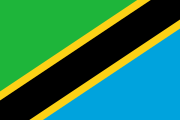The Tanzania national football team represents Tanzania in men's international football and is controlled by the Tanzania Football Federation, the governing body for football in Tanzania, Tanzania's home ground is Benjamin Mkapa National Stadium in Dar es Salaam and their head coach is Adel Amrouche from Algeria. They are colloquially known as the Taifa Stars. Tanzania has never qualified for the FIFA World Cup. Before uniting with Zanzibar, the team played as the Tanganyika national football team, The team represents both FIFA and Confederation of African Football (CAF).

The 1992 Thomas & Uber Cup was the 17th tournament of the Thomas Cup, and the 14th tournament of the Uber Cup, which are the major international team competitions in world badminton. The 1992 final stage was held in Kuala Lumpur, Malaysia, on May 16, 1992.
The 1990 Thomas & Uber Cup was the 16th tournament of the Thomas Cup, and the 13th tournament of the Uber Cup, which are the major international team competitions in world badminton. The 1990 final stage was held in Tokyo, Japan, in May 1990.

The Singapore Open is a badminton event that has been held in Singapore annually since 1929. Badminton World Federation categorised Singapore Open as one of the six BWF World Tour Super 750 events in the BWF events structure since 2023.

The 1994 Thomas & Uber Cup was the 18th tournament of the Thomas Cup, and the 15th tournament of the Uber Cup, which are the major international team competitions in world badminton.

The Nigeria national badminton team represents Nigeria in international badminton team competitions. It is managed by the Badminton Federation of Nigeria, the governing body of badminton in Nigeria. Nigeria was one of the seven African countries that formed the Badminton Confederation of Africa on 31 August 1977. The country first competed in the African Badminton Championships in 1980.
The 1978 WBF World Championships took place in November 1978 in Bangkok, Thailand. This event was followed by Invitational Championships which took place in the month of February earlier this year in Hong Kong. It was the first of the two editions of the world championships organised by the WBF, which was a rival organisation of the Badminton World Federation.

The Philippines national badminton team represents the Philippines in international badminton competitions. It is controlled by the Philippine Badminton Association. Nicknamed Smash Pilipinas, The Filipino team won bronze in the men's and women's team events at the Southeast Asian Games, in 1987 and 1981 respectively.

The Hong Kong national badminton team is a badminton team that plays for Hong Kong SAR, China in international competitions. The Hong Kong national team won bronze at the 2019 Badminton Asia Mixed Team Championships, also known as the Tong Yun Kai Cup.
The Sidek family is a Malaysian family with a significant history within professional badminton. The patriarch of the family was an avid badminton fan, Sidek Abdullah Kamar (1936–2005), who himself was a former player turned senior coach. He started to train his sons from an early age at their house in Banting.

The Kenya national badminton team is a badminton team that plays for Kenya in international competitions. It is controlled by Kenya's governing body for the sport, Badminton Kenya. Kenya is one of the first three countries to compete in the inaugural African Badminton Championships in 1979.

The Mauritius national badminton team represents Mauritius in international badminton team competitions. It is controlled by the Mauritius Badminton Association, the governing body of badminton in Mauritius.

The Norway national badminton team represents Norway in international badminton team competitions. It is controlled by the Norwegian Badminton Association. Norway participated in the Sudirman Cup until 2007. The national team have never qualified nor competed in the Thomas Cup and the Uber Cup.

The Belarus national badminton team represents Belarus in international badminton team competitions. The Belarusian team is managed by the Belarusian Badminton Federation (BBF) which organizes badminton championships and prepares Belarusian national badminton teams. The team was formed in 1992 after the association was found.

The Myanmar national badminton team represents Myanmar in international badminton team competitions. The best result for both men and women's team was a third place finish at the 1979 and 1995 Southeast Asian Games. The men's team was selected to take part in the 1976 Thomas Cup but failed to qualify into the first round.

The Ghana national badminton team represents Ghana in international badminton team competitions. Ghana Badminton is the national governing body of the sport representing every member of the badminton community in Ghana.
Wu Wenkai is a Chinese badminton player. He competed in the men's singles tournament at the 1992 Summer Olympics.

The Iran national badminton team represents Iran in international badminton team competitions. The national team of Iran is administered by the Iran Badminton Federation.
The men's team tournament at the inaugural Asian Badminton Championships, also known as the Tunku Abdul Rahman Cup took place from 21 to 28 April 1962 at Stadium Negara in Kuala Lumpur, Malaysia. The trophy is named after Tunku Abdul Rahman, the first prime minister of Malaysia. A total of 12 teams competed in this event.
The qualifying process for the 1957 Uber Cup took place from 30 August 1956 to 16 March 1957 to decide the final teams which will play in the final tournament.













